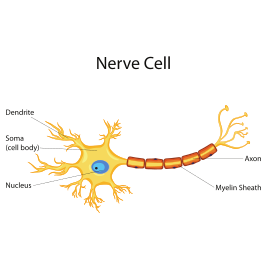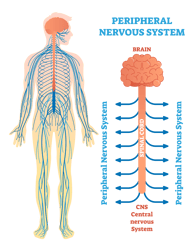
What is Neuropathy?
There are over 100 known causes of neuropathy, and over 20 million Americans suffering from neuropathy. Neuropathy is a chronic condition causing...
Schedule your consultation or contact us at (517) 883-2479
Karen May, DC, CCSP, CCIP
There are over 100 known causes of neuropathy, and over 20 million Americans suffering from neuropathy.
 Peripheral neuropathy is caused by damages to the peripheral nervous system. The peripheral nervous system (PNS) is what is sends messages to and from the spinal cord and brain, to the rest of the body. When the PNS suffers damage, it sends mixed signals to the central nervous system, causing the painful symptoms of neuropathy and disorientating your body.
Peripheral neuropathy is caused by damages to the peripheral nervous system. The peripheral nervous system (PNS) is what is sends messages to and from the spinal cord and brain, to the rest of the body. When the PNS suffers damage, it sends mixed signals to the central nervous system, causing the painful symptoms of neuropathy and disorientating your body.
If left untreated, neuropathy will progress. Often starting in the toes or fingers, and progressing to legs or arms.
Common symptoms of neuropathy include:
Despite the devastation that neuropathy causes millions of America a year, there is no cure for neuropathy. In fact, most of the common treatments for neuropathy are designed to cover the symptoms of neuropathy, not to treat the affected nerves.

There are several types of medications that are commonly prescribed for neuropathy sufferers. But the difficult truth is there are no medications that slow down or reverse neuropathy. The medications that are prescribed for neuropathy are “off label, meaning most of the time these are actually anti-convulsants or antidepressants which only serve to reduce nerve pain as a secondary effect.
These drugs often produce horrible side effects too, including dizziness, drowsiness, addiction, reduced coordination, memory loss, anger and depression… even suicidal feelings.
A transcutaneous electrical nerve stimulation or a TENS unit is a battery-operated device that is often recommended for neuropathy pain. The TENS unit numbs the affected areas for a temporary relief, instead of actually treating the affected nerve pathways.
There are also alternative approaches to treating neuropathy symptoms. A few of those include:
While the American healthcare system is great at treating acute conditions like a broken bone or an asthma attack, they are not well equipped for treating chronic illness like neuropathy. Instead of treating neuropathy, the common medications and treatments recommended are designed to cover the symptoms.
At Momentum Health Neuropathy Center, we believe you deserve long-lasting freedom from neuropathy symptoms. And because my team has seen case after case of victory, healing, and changed lives - we’re thrilled to be in your corner to see you succeed as well.
Stop covering your symptoms and start rebuilding your nerves.
Call my team of experts today and start getting back to you!

There are over 100 known causes of neuropathy, and over 20 million Americans suffering from neuropathy. Neuropathy is a chronic condition causing...

Radiation therapy is a common treatment used for treating cancer. Radiation therapy works by using beams of energy to destroy cancer cells.